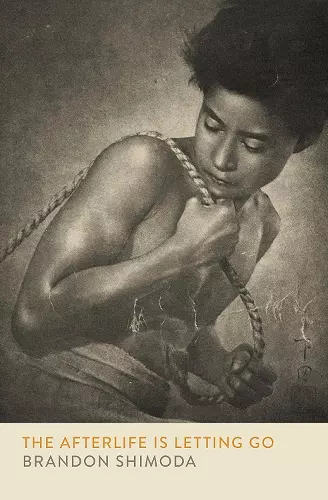The Afterlife is Letting Go
Format:Paperback
Publisher:City Lights Books
Published:23rd Jan '25
Should be back in stock very soon

Chosen one of Booklist's Top Ten History Books of the Year!
"The Afterlife Is Letting Go is a meditative consideration of Japanese American incarceration during WWII by Brandon Shimoda, author of the PEN Open Book Award–winning The Grave on the Wall."—Matt Seidel, Publishers Weekly's "Big Indie Books"
"Both personal and choral, The Afterlife is Letting Go is deeply felt, precise, and as generous in its insights as it is unsparing in its critiques of how 'exclusion zones' proliferate and reach across time and space. A stirring, trenchant, and necessary work."—Christina Sharpe, author of Ordinary Notes
In a series of reflective, multi-layered, sometimes multi-voiced essays, poet Brandon Shimoda explores the “afterlife” of the U.S. government’s forced removal and mass incarceration of Japanese immigrants and Japanese Americans during WWII, excavating the ways these events continue to resonate today. What emerges is a panoramic, yet intimate portrait of intergenerational trauma and healing.
Informed by personal/familial history, years of research and travel, including visits to museums, memorials and the ruins of incarceration sites, these essays take us on both a physical and a metaphysical journey. What becomes increasingly clear are the infinite connections between the treatment of Japanese Americans and other forms of oppression, criminalization, dispossession, and state violence enacted by the United States, past, present, and ongoing.
"Our ancestors' untold tales visit us as haunts until we allow them through our own voices, is part of what Shimoda understands; he cannot help but speak, not for them, but to them, in front of us."—Harmony Holiday, Bookforum
"Brandon Shimoda hauntingly, brilliantly spotlights an expansive community of descendants—including himself—confronting the aftermath of the unjustified incarceration of Japanese Americans."—Terry Hong, Shelf Awareness, Starred Review
"Poet Shimoda's essay collection about the World War II-era internment of Japanese-American citizens in camps. . . . It's a remarkable testament."—Bethanne Patrick, The Book Maven: A Literary Review
"Fourth-generation Japanese American poet Brandon Shimoda's The Afterlife Is Letting Go, a well-researched, intriguing essay collection, reappraises not only the official narratives but also the supposedly ameliorative efforts made subsequently."—Anita Felicelli, The Los Angeles Times
"In a wrenching exercise to understand history and his own biracial ancestry, Shimoda visits the ruins of incarceration sites and connects with many descendants of the Japanese Americans whose lives were upended during WWII. Mere statistics are never enough to drive home the severity of a wound, especially one that impugns the moral fabric of a country that is supposedly a beacon for human rights. It's sobering that many of those Shimoda interviewed speak up at another time in which immigrants are painted anew as the terrifying 'other.' Tragic and illuminating." —Poornima Apte, Booklist Magazine, Starred Review
"With a steady hand and a poet's knack for concision, Shimoda constructs an anguished archive of intergenerational pain."—Publishers Weekly
"Shimoda researches the mass incarceration of Japanese Americans during WWII, and speaks with descendants of those imprisoned, for this essay collection about the 'afterlife' of cruelty and xenophobia in the U.S."—The Millions' "Great Fall 2024 Book Preview"
"Time itself becomes the material by which grief and resilience of generations of Japanese Americans are wrought in a nuanced undertaking that is at once scholarly and lyrical."—Tiffany Troy, The Tupelo Quarterly
"Brandon Shimoda is investigating ghosts of our ancestors' pasts, for the same reason that I do: to tell their truths, to preserve history on their terms, to put the reader in both his and their shoes. It's done through a poetic, human lens that centers us in a real and honest way, rather than centering how the white gaze might seek to slant the perspective of what happened to us, or worse, to erase the memory of it."—Elizabeth Ito, creator of City of Ghosts
"Shimoda prises open the language of erasure, and in forensic detail traces the disturbing compulsion to deny and suppress. . . . He connects the use of Executive Order 9066 in the 1940s to today's carceral structures of racial segregation . . . [and] brings together the work of other Japanese American artists, writers and activists to create a potent archive for those seeking strategies, resources and the courage for the journey into what Shimoda reveals as the afterlife where both the past and future are intrinsically intertwined."—Kirsten Emiko McAllister, author of Terrain of Memory: A Japanese Canadian Memorial Project
"Poet and essayist Brandon Shimoda reconstructs an ever-shifting narration, an unforgettable constellation of voices of the Japanese American incarceration survivors and their children, grandchildren, great grandchildren, including his own. Like the 'hinotama: balls of light' witnessed by the incarcerated The Afterlife is Letting Go also sparks of grief—it's a mourning star, orbiting our collective consciousness of night."—Don Mee Choi, author of Mirror Nation
ISBN: 9780872869295
Dimensions: unknown
Weight: unknown
232 pages